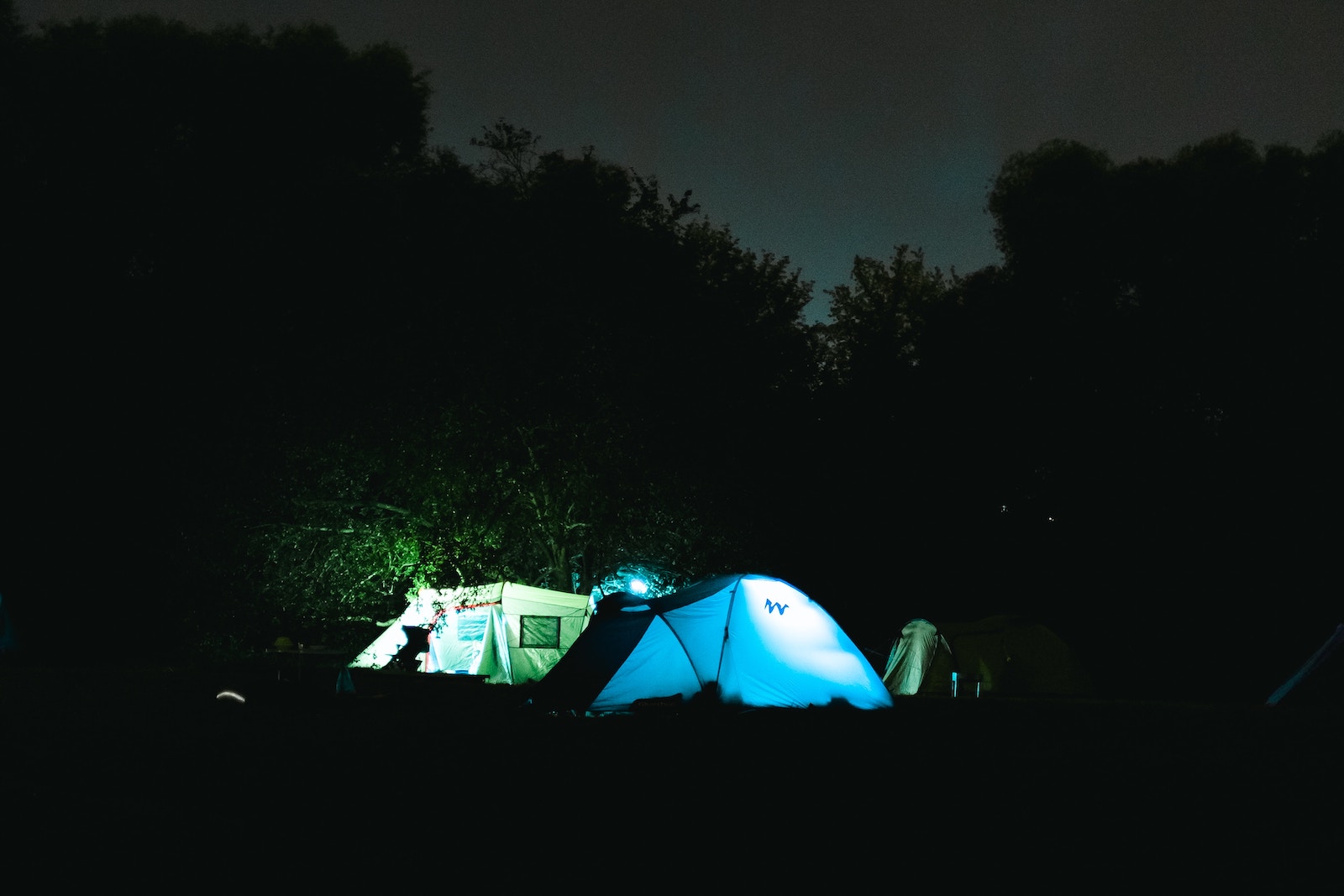An Echo in the Forest by Jennifer Dodge

It was a spur-of-the-moment camping trip. Normally, you plan your outdoor adventures well in advance. You want to gaze up at the stars and not hear the whoosh of a toilet flush nearby. Of course, there are spots where there are no toilets, but this requires a shovel, and you’re not that kind of camper. Because you booked it late, your spot is in the center of the campground. Trees are sparse, and privacy is nonexistent. You exchange wry grins with your spouse.
You hope there won’t be a storm of yellow jackets like that time you had to haul ass into the tent to stave off being eaten alive. Then again, you did book a site at Yellow-Jacket Campground. You hope there won’t be a gaggle of girls knocking back whisky and video-calling their crushes. You can’t imagine that another family will park a speaker three feet from your tent and play Mariachi music all day long. Finally, you hope that when people in RVs bust out their cinema-sized TV screens, they will at least have the common decency to haul them back in when the stars come out. You hope this time that you will experience an actual camping trip. One that offers respite from the chaos that has consumed you for the last nine years.
As nearby campfires begin to peter out, the family next to you keeps theirs roaring. You hold hope that they will turn in soon and burrow into the warm cocoon of your sleeping bag. Your eyelids grow heavy and your breathing slows. You’re on the brink of sleep when a man’s voice sears through your sleepy haze. The hope you hold slips like an untethered balloon from your fingers and you spring forward, your face filling with heat. Other campers shout for the man to shut up. His family urges him to please be quiet. The man shoots back, “It’s my Saturday night, Goddamn it!”
“Jesus,” your husband sighs and then, asks, “Should we leave?”
You think, why should we leave while this man stays? You yank the zipper on the tent’s door, step outside, and call out, “It’s after midnight; please be quiet. Your neighbors are trying to sleep.”
He slams back, “I’ll fight you! Don’t you tell me to shut the fuck up!”
The rest of his words are drowned out by a memory rising like a tidal wave over your thoughts. Your first husband had said, I’ll hit you in the head with a shovel and bury you with it. You flinch and fly back inside, curling into a ball. Your husband bolts upright and shouts, “I’m calling the police!”
The glow from your husband’s phone lights up your tent like a spotlight.
“Turn off your phone!” You snap. “He’s threatened to fight.”
“What do you want to do?” he asks.
Your thoughts scatter like leaves tussled in a gale: stay—hide—leave—wait. Wait. Don’t draw attention—don’t make it worse.
“Let’s just try and sleep,” you say.
You lie down together and ease your head against his chest. But sleep is impossible. Outside, you hear dry leaves crunch as footfalls near your tent. Your heart knocks up a beat. There are strained whispers between the man who has been yelling and a woman. You sit up and lean into their words.
“You don’t love me. It’s a lie.” he yowls.
“Yes, I do love you,” she replies.
“No, you don’t. You’re just saying that, so I’ll shut up. My own wife telling me to shut up,” he says, his voice rising.
You stare at the silhouettes of tree branches slicing across the tent and listen as her soft voice ripples a pang of awareness in you. Their whole dynamic is an echo of your first marriage. You see in her, what you could not see in yourself. It is the gentle way she approaches his sudden change in temperament that makes you realize she is fawning.
At first, it was just your dangly earrings that he wanted you to change, then it was the way you groomed, the way you cleaned or how you laughed. Eventually, it was just all of you. You carved out small pieces of yourself and molded them into the shape he desired. You anticipated his moods and altered yours. His happiness was your peace. Fawning—pleasing him, made you forget how fragile you were in his presence.
Now, all this time later, you want to call out to the woman that she is in danger. But how can you describe the way you silenced your voice, dismissed your needs, and contorted yourself over time? How can you say anything at all, when you are still inside your tent?
Sparks from the fire outside snap, and the man calls her a whore, a bitch, a liar. She is sobbing that uncontrollable howling sob that makes your skin scream. Suddenly, everything feels far away—your camping knife, the police, and where is the goddamn campground host? Is anyone going to step up and stop him? Then in the middle of his tirade, he yells, “I shaved my balls for this!”
You think, is he serious? Does he think setting the mood involves berating his wife? Of course, he does. You are doing nothing; you are letting it happen. You know what you need to do. What you should have done hours ago. What you should have done nine years ago when your first husband squeezed his fingers around your throat. You find your phone and dial 9-1-1. As soon as the dispatcher picks up, relief pours over you. You say, this man is a menace, he is out of control and he needs to be stopped.
The dispatcher tells you that officers are on their way. You hang up and immediately start packing. If they don’t arrest him, you want to be gone if he retaliates against you. The man continues to berate his wife and she continues to sob. Minutes feel like hours. It takes the cops nearly forty minutes to arrive. Two patrol cars meander down the gravel road and you feel the pinch of your lip underneath your teeth. You hope that he doesn’t see them. But at the last second, he does and flees into his tent. And at that moment, a rage, a roar emerges from your throat, “Come out, you coward!”
You point to the man’s tent, and the officers flood it with their flashlights. The man pretends to be asleep, but they rouse him and he agrees to be quiet. They let him go. When the police question you about the man, you repeatedly ask about the woman. You ask if she is okay. Yes, yes, they assure you, she is fine. And no, no, she does not want to make a report. Their shoulders shrug with the sense that it’s just another domestic dispute, kind of thing. How boring and undramatic it is to them. And you feel that small and helpless feeling again unwinding in your spine.
On the drive home, you watch the approaching dawn unspool a ribbon of tangerine light over the mountain range. With your window all the way down, you inhale notes of western cedar rolling over the ripe morning air. You wonder if calling the police had mattered. If it changed anything for her. If it changed anything for you?
 Jennifer Dodge is a writer and therapist living in Oregon. She is currently working on a memoir about self-discovery and the courage to heal invisible wounds. Her poem, “We Are Here,” is forthcoming in the Spring Issue of Blue Heron Review. Jennifer’s writing can be found online at Jennifer-dodge713.medium.com
Jennifer Dodge is a writer and therapist living in Oregon. She is currently working on a memoir about self-discovery and the courage to heal invisible wounds. Her poem, “We Are Here,” is forthcoming in the Spring Issue of Blue Heron Review. Jennifer’s writing can be found online at Jennifer-dodge713.medium.com
